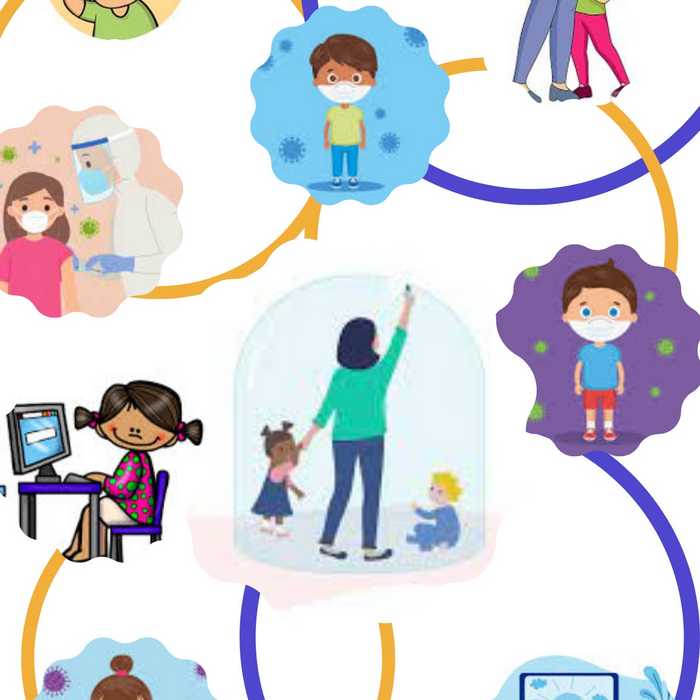2 years on, what effect has Covid had on children?

Covid-19 has governed our lives for the last 2 year and as we slowly learn to live with its presence, I reflect on the impact the pandemic had, and continues to have, on our children. 23rd March 2022 marks 2 years since the government ordered the public to “stay at home”, and schools in England were instructed to close their doors.
It is easy to remember the anxiety and apprehension that we all felt at such a drastic command, but was this the experience of our children or did they simply see it as an extended holiday at home? Speaking with parents, teachers, and therapists I have collated a snapshot of their thoughts on how the pandemic has affected children of all ages.
Pre-school/Primary Teacher
During Lockdown/Restrictions
- Children were not observing “typical” social interactions e.g. communication between their parents in the playground, or interactions between their parents and the teachers.
- Home schooling gave children an opportunity to learn more creatively, in a multi-sensory way, which the curriculum limits within schools.
- Home schooling gave parents an insight into their child’s learning and methods of teaching.
- For those children with additional needs, the frequent changes in routine and rules were difficult to handle and this often presented itself with challenging behaviours.
Since Lockdown
- We have observed that the children in our setting need more encouragement to go outside and they appear more content to stay inside.
- In the September intake it took longer for the children to build relationships with the adults in the setting.
- Transitions from home to school can be more challenging e.g. children find it harder to leave their parents at drop off.
- Children have learnt to play independently.
Secondary Teacher
During Lockdown/Restrictions
- For some pupils it offered autonomy in their learning, and they developed skills in self-learning but for others the lack of teacher interaction meant that they failed to engage, and this has put them at a disadvantage.
- It was also clear that the children missed social interaction and there was an increased usage of social media. Misuse of social media become an increasing concern.
- For those children who find exam conditions difficult, the move from exams to teacher assessment was a positive experience as they achieved the grades they had demonstrated throughout the year, rather than grades based on their performance in an exam.
Since Lockdown
- Some children have learnt to work independently with less requirement for adult intervention.
- Children are finding it more challenging to cope in social situations and are requiring more support with resilience.
- Pupil anxiety has increased.
Specialist teacher
During Lockdown/Restrictions
- Children missed out on external experiences, such as visiting the therapy farm.
- They did not receive the therapy they are entitled to.
- Children who remained in residential care were only able to see their parents via a zoom video as visitors to the school were not permitted.
- For those children who stayed at home, there was an increased pressure on parent-teacher relationships as we strived to set work that was achievable with the pressures of home life.
Since Lockdown
- It has been positive to see how the students have benefited from re-establishing routine and rewarding to watch the children enjoying themselves in external activities again.
- There is still a lot of anxiety for the families of clinically vulnerable children, and this places strain on the school/parent relationships.
- We have found that for many children that they have had a decline in their communication or physical skills, so we are revisiting old therapy goals to readdress their needs.
Parents of pre-school/primary school children
During Lockdown/Restrictions
- As I parent, I worried and over thought everything that my child had missed out on compared to her older siblings, but I also realise she doesn’t know any different
- Our daughter had more 1:1 time with both of her parents when we would otherwise have been working but lacked interaction with people outside her family home.
- Our children were 3 and 4.5 when the pandemic started, they were blissfully unaware and thought of covid as an abstract concept. There only concerns were that it stopped them visiting friends, grandparents or their favourite farm park.
- Even when they returned to school, they never understood the scale of it as a virus, and just get excited at the prospect of 10 days off school.
Since Lockdown
- Our children are now happier to be at home and can entertain themselves more easily
- One of our children is particularly clingy now and struggled to start back at school.
Parents of Secondary school children
During Lockdown/Restrictions
- Home schooling put additional strains on our relationship with our children, at a time when parent-child relationships are often strained already.
- Our child transitioned to Secondary school in September 2021, and she found this very hard. She was unable to say goodbye to her primary school friends and teachers and there were no transition days to her new school.
- Our child left school in June 2020 and there was no closure. The removal of exams left him feeling disappointed that all the work he had put in was for nothing, and he did not have a school prom or leavers party to say goodbye to his peers.
Since Lockdown
- Parents generally reported an increase in their children’s anxiety since the end of lockdown.
- They hope that their may be changes to the assessment process for GCSE and A-Levels to include a variety of assessment methods
- Children appreciate social contact more, however, they have found it hard to manage conflict or disputes within friendship groups.
Private Therapists
During Lockdown/Restrictions
- The restrictions on face-to-face contact encouraged therapists to be more innovative.
- It also encouraged us to work on clear communication with the family to ensure that they had all the necessary information to carry out their child’s therapy.
- When restrictions eased and we were able to start treatment again, the use of PPE was a hard concept for the children to understand and it had a negative impact on our interaction with the children, many of whom have impaired speech and language skills.
Since Lockdown
- We have seen a dramatic increase in the demand for private therapy over the last two years.
- Families are finding ways to pay for therapy themselves as the statutory waiting lists are so long, and these families are often at the end of their tether as they have fought for so long.
- We have also noticed a general decline in children’s performance across the board.
- There are instances where families have strived during lockdown and been able to engage in more thorough therapy programs at home.
- This frequency of therapy, however, is hard to maintain now that “normal” routines have resumed with school daily, extra-curricular activities, parents returning to work and social commitments.
It is clear that the covid-19 pandemic has had a profound and lasting impact on children of all ages. We are all more than aware of the negative impact school closures and countrywide lockdowns have had on our children, however, it is important to acknowledge that, despite what we as adults may think, not all children perceive this as a negative experience and there will be learning to take forward.
In education, we should continue to challenge the way that the curriculum is delivered and assessed to ensure that the needs of all children are being considered. This may include a more creative, multi-sensory approach, with a range of assessment methods which is inclusive of all children’s learning styles.
As parents, we will encourage independent play and self-learning which our children have developed during the pandemic. We will value the importance of our social networks and cherish the time our children spend with their peers and loved ones. When the pressures of our everyday life feel too much, we will acknowledge how beneficial it is to have routine back in our children’s lives and the luxury of choosing what activities to do at a weekend.
Ultimately, we cannot change the experiences our children have been through over the last 2 years, but it is our responsibility to facilitate their growth going forward. So just remind those children…
“Somewhere inside all of us is the power to change the world” – Roald Dahl
Mary Tavinor, Head of Case Management - South / Specialist O.T Children / Case Manager.
Posted by Nicola Kelly on March 14th 2022

